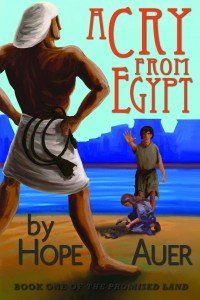American Tapestries is a new series of Christian Historical Fiction books. The books, all written by different authors, are set in epic moments of American History. These two books are the first in the series, with more to come soon.
Where the Trail Ends – Melanie Dobson
About the Book:
A young woman traveling the Oregon Trail in 1842 must rely on a stranger to bring her to safety. But whom can she trust with her heart?
For two thousand miles along the trail to Oregon Country, Samantha Waldron and her family must overcome tremendous challenges to reach the Willamette Valley before winter. Together they weather autumn storms, hunger and thirst, and the dangers of a wild and unfamiliar country. But when their canoe capsizes on the Columbia River, they must rely on handsome British exporter Alexander Clarke to rescue them from the icy water.
Alex escorts Samantha and her young brother, Micah, to Fort Vancouver. There Samantha is overwhelmed with men vying for her affections, but the only one who intrigues her-Alex-is the one she cannot have. When his betrothed arrives unexpectedly from England to escort him home, Samantha becomes determined to create a home for herself and Micah in the fertile valley far away from the fort. But how will an unmarried woman support herself and her brother in the wilderness alone?
Then Micah disappears into the wilderness one rainy night, and Samantha must rely on the man she loves-the man she’s trying desperately to forget-to rescue her brother before it’s too late.
Meet Melanie:
Melanie Dobson has written ten contemporary and historical novels including five releases in Summerside’s Love Finds You series. In 2011, two of her releases won Carol Awards: Love Finds You in Homestead, Iowa (for historical romance) and The Silent Order (for romantic suspense).
Prior to her writing career, Melanie was the corporate publicity manager at Focus on the Family and a publicist for The Family Channel. She later launched her own public relations company and worked in the fields of publicity and journalism for more than fifteen years.
Melanie and her family enjoy their home in the Pacific Northwest. The entire Dobson family loves to travel and hike in both the mountains and along the cliffs above the Pacific.
When Melanie isn’t writing or playing with her family, she enjoys exploring ghost towns and dusty back roads, line dancing, and reading inspirational fiction.
Find out more about Melanie at http://www.melaniedobson.com.
Link to buy the book (Not my affiliate link) http://ow.ly/e0YC2
Queen of the Waves – Janice Thompson
About the book:
When pampered Jacqueline Abington secretly elopes with the family gardener, she asks another woman to take her place on the much anticipated maiden voyage of the Titanic. Tessa Bowen hails from a poor corner of London but has been granted the opportunity of a lifetime—a ticket to sail to America aboard a famed vessel. But there’s a catch: she must assume Jacqueline’s identity. For the first time in her life, Tessa stays in luxurious quarters, dresses in elegant gowns, and dines with prestigious people. Then a wealthy American man takes an interest in her, and Tessa struggles to keep up the ruse as she begins falling for him. When tragedy strikes, the game is up, and two women’s lives are forever changed.
Meet Janice:
Award-winning author Janice Thompson, who also writes under the name Janice Hanna, has published nearly eighty books for the Christian market, crossing genre lines to write cozy mysteries, historicals, romances, nonfiction books, devotionals, children’s books and more.
She formerly served as vice president of the Christian Authors Network and was named the 2008 Mentor of the Year by the American Christian Fiction Writers.
Thompson lives in Spring, Texas, near her four grown daughters and young grandchildren. She leads a rich life with her family, a host of writing friends and two mischievous dachshunds.
Readers can keep up with Janice Thompson by visiting janiceathompson.com, becoming a fan on Facebook or following her Twitter. Find out more about Janice at http://janicethompson.com.
Link to buy the book (Not my affiliate link): http://ow.ly/e0YHw
MY REVIEW:
Christian Historical Fiction is my favorite genre of books, after biographies. I really enjoyed reading both of these American Tapestries books.
In Where the Trail Ends by Melanie Dobson, Samantha and her family leave on a wagon train headed to Oregon. The author did an excellent job of portraying through Samantha the hardship and sacrifices families went through on the Oregon Trail. Some, like Samantha found it all to be worthwhile when they reached the end of the trail.
Queen of the Waves by Janice Thompson is a retelling of the story of the Titanic. It’s more than just what happened to the Titanic, though. Queen of the Waves follows three women on and off the ship. You’ll learn about their lives, loves and dreams. I have seen several new Christian books on the subject of the Titanic in the last year or so. The story line off the ship is what sets the Queen of the Waves apart from the rest. This book also shows how those that didn’t get on the Titanic view the shipwreck.
American Tapestries is a great new series!
{American Tapestries Kindle Fire Giveaway and 10/18 Facebook Party}
Celebrate with Melanie by entering to win a Kindle Fire!

One fortunate winner will receive:
- A Kindle Fire
- Where the Trail Ends by Melanie Dobson
- Queen of the Waves by Janice Thompson
Enter today by clicking one of the icons below. But hurry, the giveaway ends on October 17th. Winner will be announced at the American Tapestries Author Chat Facebook Party on 10/18. Connect with authors Melanie Dobson and Janice Thompson for an evening of book chat, trivia and fun! There will also be gift certificates, books, and a Book Club Prize Pack to be won (10 copies for your book club or small group)!
So grab your copy of Where the Trail Ends and Queen of the Waves and join Melanie Dobson and Janice Thompson on the evening of the October 18th for a chance to connect with the authors and make some new friends. (If you haven’t read the books – don’t let that stop you from coming!)
Don’t miss a moment of the fun, RSVP today. Tell your friends via FACEBOOK or TWITTER and increase your chances of winning. Hope to see you on the 18th!
*Disclosure of Material Connection: I received these books in the hope that I would mention them on my blog. Regardless, I only recommend products or services I use personally and believe will be good for my readers. My opinions are my own. I am disclosing this in accordance with the Federal Trade Commission’s 16 CFR, Part 255: “Guides Concerning the Use of Endorsements and Testimonials in Advertising.”


















